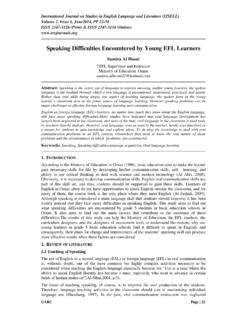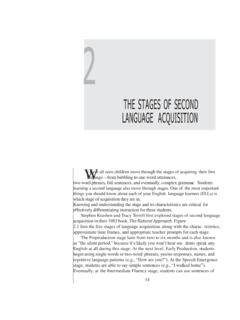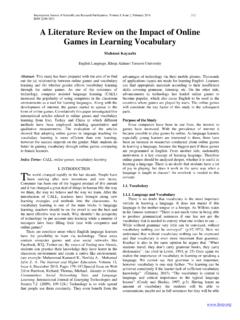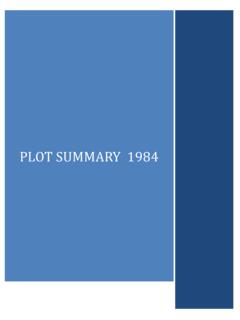Transcription of Impact of Academic Procrastination on Academic Performance
1 ISSN 2348-3156 (Print) International Journal of Social Science and Humanities Research ISSN 2348-3164 (online) Vol. 8, Issue 1, pp: (42-47), Month: January - March 2020, Available at: Page | 42 Research Publish Journals Impact of Academic Procrastination on Academic Performance Kanika Girdhar*, Manpreet Ola**, Vikas Sharma** *Kanika Girdhar, MPhil Research Scholar, AICP, Amity University Haryana **Manpreet Ola, Assistant Professor, AICP, Amity University Haryana **Vikas Sharma, Head of Department, AICP, Amity University Haryana Abstract: Procrastination has been an area of concern for all human beings. We all have experienced Procrastination and faced its consequences. Procrastination in the modern world is delaying the task or postponing it to another day. Many a times, we have looked for solutions to not procrastinate.
2 This review paper focusses on understanding different perspectives on Procrastination and Academic Procrastination . It focusses on various theories and meanings explaining the construct of Procrastination . It further explains the reasons of Academic Procrastination and its Impact on Academic Performance . It also highlights how different variables influence Academic Procrastination and Academic Performance . Keywords: Academic Procrastination , Academic Performance , Procrastination . 1. INTRODUCTION Procrastination is delaying the task at hand to another time. We all have faced this challenge at one point in our life. The delay is present despite awareness that it might lead to difficulty or challenges later. It can range from delaying everyday activities to salient tasks. It stems from fear of failure, dysfunctional beliefs, lack of interest in task or in general, lack of time, motivation, focus and proper planning.
3 Procrastination has been an important and interesting area of research. There have been considerable amount of researches to understand the very nature and components of Procrastination . Various researches focus on understanding how it is related to motivation, Performance , self-esteem, etc. The current review study aims to understand the Impact of Procrastination on Academic Performance among students. There have been inconsistent results in the past researches. Milgram (1992) accentuated that Procrastination is essentially a modern day problem, and it happens in countries where technology is advanced. The ancient Egyptians provided 2 meanings of the word procrastinate. One is the useful habit of avoiding unnecessary task and impulsive effort and the other is the harmful habit of laziness in finishing a necessary task. The term Procrastination comes from Latin verb procrastinare , meaning to put off until tomorrow.
4 (De Simone 1993). Pro means forward motion and crastinus means belonging to tomorrow. Romans use this term when it s best to wait for the enemy to be out and display patience in terms of military conflict. It is a deferred judgement which was considered necessary and wise. Bliss (1983), in his book indicates Procrastination with laziness and indifference. Lakein (1973) and Sherman (1981) emphasize on the self-defeating aspects of the behaviours of procrastinators. Milgram (1991) focussed on 4 components of Procrastination : 1. A behaviour sequence of postponement 2. Resulting in a substandard behavioural product 3. Involving a task that is perceived by the procrastinator as being important to perform 4. Resulting in a state of emotional upset ISSN 2348-3156 (Print) International Journal of Social Science and Humanities Research ISSN 2348-3164 (online) Vol.
5 8, Issue 1, pp: (42-47), Month: January - March 2020, Available at: Page | 43 Research Publish Journals Procrastination is considered as a method of self-handicapping and may be used as an excuse to avoid ego-dystonic cognitions (Ferrari, 1991). Snyder et al (1998) said people engage in variety of excuses to negotiate a more pleasant outcome for their behaviours. Procrastination is an excuse for poor Performance . Silver et al (1981) argued that all Procrastination is self-defeating. Burka and Yuen (1983) also focus on irrational nature of Procrastination . Ferrari (1994) argued that Procrastination may be self-defeating but it can also be in one s own interest and logical. He also gave two types of Procrastination : Functional and dysfunctional. 2. BACKGROUND In psychology, different theories have different explanation of behaviour of Procrastination : Psychoanalytic theories: The notions of Sigmund Freud regarding Procrastination indicate that tasks are avoided because they are threatening to the ego.
6 The role of anxiety in avoidance behaviour was best explicated by Freud in the monograph Inhibitions, Symptoms and Anxiety (1953). The challenge was to empirically test it. Blat et al (1967) tested a group of high or low procrastinators. The two groups were compared on a number of variables. No significant differences were found between groups on the: Cumulative grade point average, vocabulary or information subtest scale scores of the Weschler Adult Intelligence Scale, areas of Academic major, number of extra-curricular activities or total scores from Scholastic Aptitude Test. However, significant differences were found on measures relating to perception of time. The students who procrastinated had a lower score on the picture arrangement subtests of Weschler Adult Intelligence Scale, suggesting a diminished ability to anticipate future events. In projective tests, the students who procrastinated were found to be telling significantly more person oriented narratives than the punctual ones.
7 Also, a significant indication was that the stories of procrastinators had more themes concerning death. Results indicate that chronic lateness is related to an unconscious fear of death. Psychodynamic theories: They believed Procrastination is related to childhood experiences and traumas and how it shapes cognitive processes of adults. Missildine (1964) gave chronic Procrastination syndrome and believed it is caused by faulty childrearing practices. He stated that parents of procrastinating adults over coerced achievement. They set unrealistic goals and link parental love and approval to achievement of goals. Later in life, when demands are put on the adult to prove his worth, they tend to avoid the tasks as they don t want to face disappointment. Macintyre also believed that faulty childrearing can result in procrastinating adults. He believed 2 parental extremes exist: too permissive or too stern resulting in procrastinating adults.
8 These are the ones which were discovered by Lay (1987), Mc Cown et al (1989) and Ferrari et al (1993). Spock in his writings explained people find themselves chronically unable to finish a task because it reminds them of early childhood conflicts between themselves and their parents. They became procrastinators without any insight. The challenge remains that these concepts are difficult to operationalize. Mc Cown et al (1991), who found that adult children of alcoholics were more likely to report high Procrastination scores than other college students. Ferrari et al (1984) found that women s Procrastination scores were significantly related to their father s authoritarian parenting style. Such women also reported indecisive mothers and suppressed anger. Procrastination is used as a passive aggressive behavior strategy to cope with family environment. Behaviorism theories: Procrastination represents a form of escape or avoidance conditioning.
9 The challenge is that it doesn t explain individual differences in procrastinating behavior. Some people procrastinate much of the time and others don t. ISSN 2348-3156 (Print) International Journal of Social Science and Humanities Research ISSN 2348-3164 (online) Vol. 8, Issue 1, pp: (42-47), Month: January - March 2020, Available at: Page | 44 Research Publish Journals Cognitive and Cognitive Behavioral theories of Procrastination : Knaus & Ellis (1977) stated that Procrastination is related to irrational fears and self-criticism. Failures are bound to happen because standards are too high. The avoidance of the task involves becomes a convenient excuse to avoid the failure. Research reports Procrastination is related to irrational dysfunctional beliefs (Pychyl et al 2012) core beliefs and negative automatic thoughts for eg.
10 Perfectionism. Motivational Theories: Theories of motivation explain the choice to postpone tasks and assignments along with its ability to explain decision making process. Steel and Konig (2006) proposed a general model of motivation: Temporal motivation theory (TMT). This model is derived from vroom s expectancy theory (1964), hyperbolic discounting (Ainslie & Haslam, 1992), cumulative prospect theory (Tverky & Kahneman, 1992) and need theory (Dollard & Miller, 1950). This was used as a motivational approach to understand Procrastination by Steel in 2012. TMT explains that a person will procrastinate a task depending on: 1. Expectation of achieving a desirable outcome 2. Value of the outcome 3. Timing of that outcome 4. Sensitivity to delay gratification It is collectively known as Procrastination equation. Self-Efficacy Theory: Self-efficacy is the belief in one s own ability of the person to perform a task.












